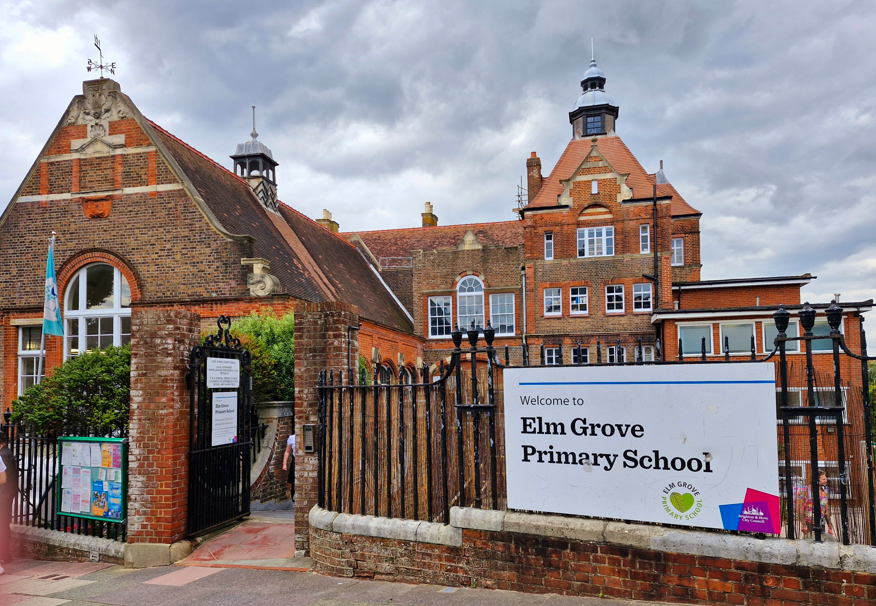A government minister marked Back to School Week with a visit to a Brighton primary where he learnt about the practical ways being used to support children’s mental health and improve attendance.
Stephen Morgan, Minister for Early Education in the new Labour government, met staff and children at Elm Grove Primary School along with new head teacher Ben Massey.
Mr Morgan said: “I’ve been really impressed by how they’ve embedded mental health right through the school.”
He said that there was dedicated support and that the whole staff backed the school’s ethos which he said was vital in breaking down the barriers to poor attendance and poor attainment.
The minister was given a tour of the school which is based in a listed Victorian building in Elm Grove and has about 400 pupils.
As well as the computer room which doubles as a library, Mr Morgan was shown spaces where children were able to spend quiet time by themselves – the Canopy and the Nest.
The latter is home to the Toast Club where children who may have skipped breakfast can grab a slice or two as part of an effort to ensure they are genuinely ready to learn.
And the grounds include the Pantry – an unofficial food bank – where anyone can drop off or take away food and spare items of uniform.
The minister was told that opening up the Pantry to everyone had meant there was no stigma attached to those who really needed the help.
Mr Massey told him that the school was reaching out to support those children and families who needed more help and he praised all those families who gave their support to the school.
The minister also heard from a couple of staff who support children with anxiety or other mental health or behavioural problems – Carla Kemp, the SENDCo or special educational needs and disabilities co-ordinator, and Sam Barfoot, inclusion mentor and attachment and senior mental health lead.
Mr Morgan praised the work that they were doing to improve attendance which dropped dramatically during the coronavirus pandemic and had not yet returned to normal.
The pandemic also appeared to have fuelled the increase in the number of children and young people with mental health problems, he said, although the trend had been evident since 1999.
It coincides with an era of rolling news, climate concern and greater awareness of recent conflicts.
The minister wanted children in ever school to have access to mental health support and Brighton and Hove City Council was among the first local authorities to invest specifically in ramping up support.
This approach began before the pandemic and attendance figures suggest that officials had done well to anticipate the need.
More than 6,000 children – or one in five – missed school persistently in Brighton and Hove during the 2022-23 academic year, according to figures from the Department for Education (DfE).
The rate of persistent absence has soared since the coronavirus pandemic restrictions from 11.5 per cent in 2018-19, before covid, to 21.6 per cent in the latest full-year figures.
The school day is divided into two sessions – morning and afternoon – and pupils who miss more than 1 in 10 sessions are classed as persistently absent.
Some 6,194 children out of 28,673 were persistently absent from state-funded schools in Brighton and Hove in 2022-23, according to the DfE.

The rate of 21.6 per cent in Brighton and Hove is slightly above the national average rate of 21.2 per cent – or 1.6 million children. Persistence absence has dropped slightly in the past year.
The national rate fell from 22.5 per cent in 2021-22 but is nearly double the rate in 2018-19 when 10.9 per cent of pupils were persistently absent.
The proportion of children whose parents were fined – through a penalty notice – rose to 7.8 per cent in Brighton and Hove in 2022-23, up from 4.9 per cent the year before.
The rate in West Sussex was 5.6 per cent, up from 3.2 per cent, and in East Sussex the proportion rose from 3 per cent to 5.2 per cent.
Mr Massey said that he and his colleagues did not want parents to face fines but preferred to work with them to ensure that children were back in the classroom and able to learn.
The minister said: “If a child is struggling with their mental health, they might miss school and their attainment might not be as good as it could be.
“Every child should be able to know there’s dedicated mental health support available at a time when they might be struggling.”
The policy relies on the idea that money spent tackling problems early, including with mental health, can reduce absence and build good habits and that these prevent more costly problems later on.
Children with poor attendance are not only likely to perform less well in exams but are more likely to end up linked to anti-social behaviour and crime.
The benefits of the upfront investment are expected not only to benefit the children who are struggling but those in the same classrooms and, in time, the wider community.
The minister praised Carla Kemp and Sam Barfoot for their work and their dedication to their roles and the children at the school.
He said: “The first thing that struck me on walking into this school is how welcoming, safe and caring it seems. Leadership is really important in this.”
Mr Morgan also said that the government was keen to push on with bringing in breakfast clubs as part of the drive to ensure every child had the best start to the day.
They were part of a strategy of improving not just attendance and punctuality but attainment for all as well.
Most schools already had breakfast clubs, he said, and they were clear links to improvements in progress.
He added: “Teachers and school support staff can see the benefits. Children coming to school who feel safe and calm … that makes a huge difference.
“I think there’s better recognition now among school governors and others of the benefits of mental health support in schools.”









Why not visit St Bart’s or St Luke’s or maybe even Queen’s Park schools to see how they are being “punished” or earmarked for closure? From my experience of Elm Grove, the children can’t behave and are barely literate. It’s more like a play group than an educational institution.